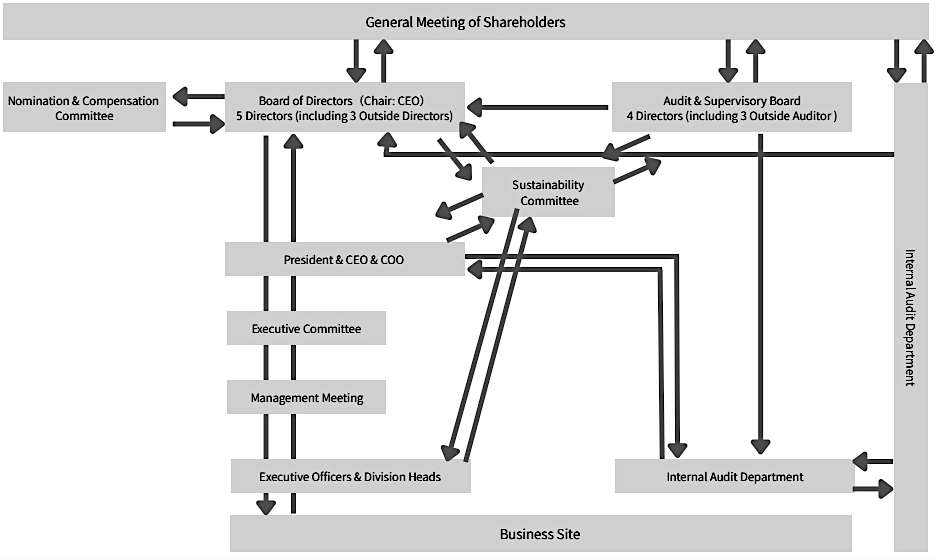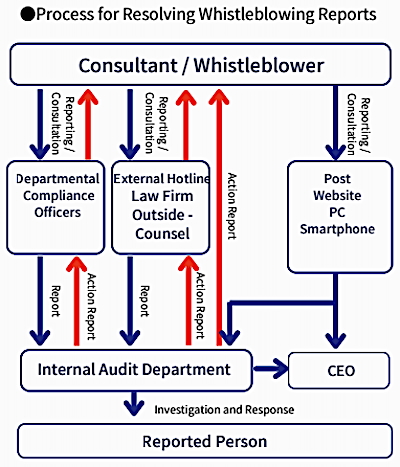Governance
Corporate Governance
Basic Approach to Corporate Governance
Our corporate philosophy is defined as follows:
“Through the provision of superior thermal energy conversion technologies and services, we contribute to the realization of an environmentally friendly and sustainable society. At the same time, we pursue the
enduring prosperity of the company, along with the happiness of our customers, shareholders, employees, business partners, and local communities.”
Guided by this philosophy, and with our corporate vision of becoming “a company trusted by stakeholders,” we have established our management objective of enhancing corporate value while ensuring sustainable growth. To achieve this, we are strengthening our corporate management framework, enhancing auditing and supervisory functions, improving transparency in management activities, and, above all, embedding compliance as a core element of our corporate culture. We are proactively implementing various initiatives to further reinforce corporate governance.
As part of these efforts, and to demonstrate our commitment to compliance, we have established and disseminated the “T.RAD Code of Conduct” as a behavioral standard for all employees across the T.RAD Group in their daily activities.
Corporate Governance Framework
■Board of Directors
The Board of Directors, in accordance with the Board of Directors Regulations, deliberates and resolves important matters of the Company, including those stipulated by laws and the Articles of Incorporation, while also supervising the execution of duties. Chaired by the Representative Director, the Board comprises two internal directors and three outside directors, thereby reinforcing the Company’s governance and oversight framework.
All directors, including the Representative Director, as well as all Audit & Supervisory Board Members, attend Board of Directors meetings, which are convened monthly in principle and on an ad hoc basis as necessary. At these meetings, Audit & Supervisory Board Members receive reports on key matters such as compliance, management strategy, business risks, and financial conditions. They also directly verify the execution of operations by requesting explanations and information from directors and executive officers.
■Audit & Supervisory Board
The Audit & Supervisory Board maintains close collaboration with the Internal Audit Department to ensure the timely receipt of information necessary to understand and monitor internal controls and related matters, and has established a framework to discuss issues as they arise. Furthermore, in order to conduct independent and impartial audits, two of the four Audit & Supervisory Board Members are appointed from outside the Company.
■Executive Committee
The Executive Committee, in accordance with the Executive Committee Regulations, establishes the Company’s overall management policies and makes decisions on important matters. The Committee is composed of full-time Directors and Senior Executive Officers, with relevant members participating as necessary, and is convened in principle once a week.
■Nomination and Compensation Committee
As an advisory body to the Board of Directors,the Company has established the Nomination and Compensation Committee,the majority of which consists of Outside Directors. With respectto the nomination of Directors and Executive Officers as well as the remuneration of Directors, matters are first referred to the Committee for deliberation prior to discussion by the Board of Directors,thereby ensuring fair and appropriate decision-making.
Compliance
Compliance Initiatives
■T.RAD Code of Conduct
We believe that the faithful implementation of the “T.RAD Corporate Philosophy” is the very means by which our Company fulfills its social responsibilities. In putting this philosophy into practice, our employees are expected to fully understand the Code of Conduct in advance and regard it as the highest priority in their actions. Through such conduct, we are confident that the value of our Company and the outcomes of our business activities will be further enhanced, thereby earning the trust of all our stakeholders.
■Compliance Training Initiatives
Compliance Education and Training
At our Company, compliance-related training is provided to new graduates and mid-career employees upon joining the Company and again after six months. The training covers a wide range of topics, starting from general concepts such as compliance and adherence to rules, to specific legal and regulatory matters including information management, the Subcontract Act, internal controls, J-SOX, and intellectual property management. Each training session is continuously improved based on feedback from participant surveys.
For our corporate officers and presidents of overseas subsidiaries, compliance training is conducted by legal professionals, enabling management to stay up to date with the latest compliance-related information and further strengthen their awareness and commitment to compliance.
■Ensuring Compliance with Labor Regulations through Mutual Audits
Labor Compliance Audits
In accordance with internal regulations, each site conducts a self-assessment of its compliance status using the “Labor-Related Legal Compliance Evaluation Sheet.” Following this, cross-audits are carried out by General Affairs Managers and responsible staff members. Across all sites, no significant non-conformities have been identified. For any issues for improvement, follow-up audits are conducted within the same fiscal year and continued annually until corrective actions are completed.
To further strengthen our compliance framework, we will continue to advance these initiatives going forward.
Overview of the Whistleblower System
Anonymous reporting is permitted, and the Company’s regulations stipulate that no disadvantage or retaliation shall be imposed on whistleblowers under any circumstances.
To ensure awareness and accessibility, information regarding the whistleblowing system is posted on the Company’s intranet (Compliance Information) and included in the HANDBOOK distributed annually to employees. In addition,details of the system are explained and reinforced through compliance training programs.
Risk management
Risk management
■Basic Philosophy (Principles)
In order to realize its corporate philosophy, T.RAD Co., Ltd. and T.RAD Group appropriately manage the
wide range of risks that may arise in the course of business activities, including economic, social, and
environmental risks. We strive to eliminate risks as much as possible, and in the event that a risk does occur, we will promptly implement appropriate countermeasures tailored to the characteristics of the risk.
Furthermore, we will continue to provide education and awareness-raising activities so that each and every employee is able to take timely, appropriate, and accurate action when risks arise.
■Basic Policy (Code of Conduct)
- Ensure the safety of human life and health, and respect human rights.
- Comply with all applicable laws and internal regulations, and promote transparent and sound management and business operations.
- Strive to ensure the quality and safety of products and services, as well as their stable supply.
- Act in good faith to eliminate or mitigate factors that may hinder the interests of stakeholders surrounding the Company.
- Each employee shall take responsible action in addressing risks.
Risks related to business activities
We conduct a comprehensive risk analysis once a year to identify risks related to our management and business activities, and to categorize them into critical risks and significant risks. These risks are visualized for clarity and prioritization.
Risk mitigation activities for critical and significant risks are incorporated into our medium-term management
plan and annual business policies. The progress of these activities, as well as the outcomes, are monitored under the Business Continuity Subcommittee of the Sustainability Committee to ensure effective implementation and tangible results.
■ Risks from Climate Change
The risks posed by climate change that may impact our Group’s business include both transition risks associated with the shift to a decarbonized society and physical risks.
The primary transition risks involve the possibility of reduced sales if our products fail to adequately respond to increasingly stringent fuel efficiency and emission regulations, as well as the accelerating shift toward electrification.
Physical risks include potential disruptions to production activities caused by intensified and more frequent extreme weather events, such as floods, which could lead to factory shutdowns or interruptions in our supply chain.
To address these risks, we are conducting specific scenario analyses related to climate change. Based on these analyses, we implement appropriate countermeasures and disclose relevant information in a transparent manner.
■Cybersecurity Measures
Our Group leverages a variety of information technology systems to improve operational efficiency, and we are strengthening measures against external cyberattacks (prevention and detection), as well as awareness and training programs for employees to respond to such threats.
We are advancing a global response framework, reviewing our security levels on an ongoing basis, and working to establish a resilient system that ensures uninterrupted value delivery to our customers, even as cyberattacks are expected to increase in both frequency and sophistication.
■Anti-Corruption
We recognize corruption and bribery as serious risk factors that can significantly undermine corporate trust. To maintain sound relationships with our stakeholders and to avoid engaging in any entertainment, gifts, or other activities that could invite suspicion or distrust from society, we have clearly set forth the following principles in our Code of Conduct and ensure thorough awareness among all employees.
- Donations and contributions are made in compliance with the laws and regulations of Japan and relevant countries, while we strive to build transparent and fair relationships with political, governmental, and public institutions and organizations.
- We strictly prohibit offering bribes or any other improper benefits to public officials (including foreign public officials and those deemed as such), and we do not engage in entertainment, gifts, or the giving or receiving of money or other benefits for the purpose of obtaining or maintaining any undue advantage or preferential treatment with any party.
Business Continuity Plan (BCP)
Business Continuity Plan (BCP)
At our company, we regard not only “manufacturing” but also emergency preparedness as an essential aspect of quality. To this end, we focus on the following three pillars to ensure business continuity and minimize losses to our stakeholders in the event of any emergency:
- Implementation of the PDCA cycle centered on training (spiral-up improvement through continuous enhancement)
- Promotion of disaster-mitigation measures at factories, offices, and in IT-related areas
- Strengthening of supply chain systems and information sharing
■Systematic Execution of Emergency Response Training
Our company prepares not only for natural disasters but also for various emergencies such as equipment failures, fires, and disruptions in distribution routes. Each site formulates and implements annual plans tailored to its specific risks. In addition, we utilize hazard maps published by local governments to identify potential regional disaster risks, thereby enhancing awareness and strengthening preparedness on a daily basis.
■Promotion of Disaster Mitigation Initiatives
At both our factories and offices, we identify hazardous areas requiring measures against falling, toppling, or scattering objects. Based on the level of priority, we develop multi-year roadmaps, allocate budgets, and implement corrective actions.
For facilities, each site prepares annual plans addressing issues such as aging equipment, anti-toppling measures, and removal of unnecessary items, and steadily carries out the necessary improvements.
In line with the Guidelines for Emergency Inspections of Buildings by Facility Managers Immediately After a Major Earthquake issued by the Cabinet Office in 2015, we conduct regular safety patrols to identify hazardous areas and implement improvements.
We also prepare lists of restricted zones to be designated during disasters, thereby reinforcing measures to ensure the safety of our employees.
- Power Switching Drills in the Event of a Power Outage
We conduct regular training to ensure that emergency power supplies operate reliably in the event of a power outage and that critical systems can be maintained.
In addition, we have secured backup power sources for production systems, enabling us to prevent system downtime and ensure uninterrupted access to essential information. - Backup of File Servers
We back up critical data on a daily basis to protect against damage, storage errors, or other potential issues.
In addition, our file servers are stored redundantly across two separate locations, ensuring data security and business continuity even in the event of an unexpected disruption.
In accordance with national and local government guidelines, we maintain a stockpile of essential food, daily necessities, and sanitary supplies. Looking ahead, we plan to expand these reserves with consideration for coexistence with local communities in times of disaster.
Since FY2019, we have also introduced a program to donate stockpiled goods to NPOs and municipalities before their expiration dates through a matching system. This initiative helps reduce waste and contributes to addressing issues such as food loss and poverty.


